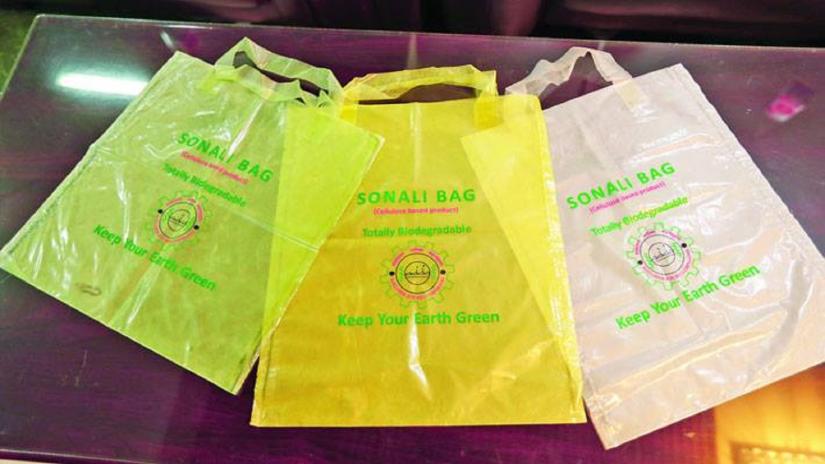 The commercial production of jute-based Sonali Bag is still not taking off due to various challenges including lack of funds and raw materials.
The commercial production of jute-based Sonali Bag is still not taking off due to various challenges including lack of funds and raw materials.
Speaking to the Dhaka Tribune, an official of the Bangladesh Jute Mills Corporation (BJMC), said that though they had planned to hit the market in January this year, they were unable to do so.
He said, “BJMC is a non-profit organization. We are facing a funding crisis. In this situation, it is impossible for us to invest in Sonali Bag.”
The product has great potential to take over the market of polythene and polypropylene bags.
Noted scientist and Chief Scientific Officer at BJMC Dr Mubarak Hossain started his work to invent a biodegradable polymer from jute fibre in 2010. After trying for several years, success finally came in 2015. The product was named “Sonali Bag” by Prime Minister Sheikh Hasina.
Mubarak said that though petroleum-based synthetic substance polythene was cheaper than a Sonali Bag, Sonali Bags were biodegradable and made from 100% organic materials.
He said, “It has great potentials. But the lengthy process of bringing it into the market is frustrating me.”
He said funding of Tk 20 million could solve the problem.
The award-winning scientist said that several private companies expressed their interest in using Sonali Bag — instead of polythene — but they failed to take orders because of the fund crisis.
He said, “Now we are producing a small number of bags after buying the raw materials with our own money.”
He added that private companies would also come forward to invest in Sonali Bag.
Sonali Bags are made of cellulose extracted from jute fibre. Despite being biodegradable, the polymer is water and air resistant and its texture is almost the same as that of polythene bags. The material is durable and strong.
Dr Mubarak claimed that jute polymer was able to bear one-and-a-half times more of a load than polythene and it decomposed within three to four months in soil.
“It can also help boost the country's economy, given the rising demand for the environment-friendly bags in developed countries,” he added.
In October, last year, BJMC and the UK's Futamura Chemical Company signed a memorandum of understanding for the commercial production of Sonali Bag.
Minister of Textiles and Jute Golam Dastagir Gazi and BJMC Chairman Shah Muhammad Nasim did not respond to repeated phone calls for their comment.
The world right now is concerned about the ecological impact of polythene and polypropylene bags. Bangladesh’s jute-based Sonali Bag could be an environment-friendly alternative.
 Business
Business
31452 hour(s) 43 minute(s) ago ;
Morning 07:38 ; Sunday ; May 19, 2024
Fund crisis bars Sonali Bag’s commercial production
Send
Fazlur Rahman Raju, Johura Akter
Published : 09:26, Apr 08, 2019 | Updated : 10:11, Apr 08, 2019
Published : 09:26, Apr 08, 2019 | Updated : 10:11, Apr 08, 2019
0 ...0 ...
/pdn/
Topics: Top Stories
- KOICA donates medical supplies to BSMMU
- 5 more flights to take back British nationals to London
- Covid19: Rajarbagh, Mohammadpur worst affected
- Momen joins UN solidarity song over COVID-19 combat
- Covid-19: OIC to hold special meeting
- WFP begins food distribution in Cox’s Bazar
- WFP begins food distribution in Cox’s Bazar
- 290 return home to Australia
- Third charter flight for US citizens to return home
- Dhaka proposes to postpone D8 Summit
Unauthorized use of news, image, information, etc published by Bangla Tribune is punishable by copyright law. Appropriate legal steps will be taken by the management against any person or body that infringes those laws.
Bangla Tribune is one of the most revered online newspapers in Bangladesh, due to its reputation of neutral coverage and incisive analysis.
F R Tower, 8/C Panthapath, Shukrabad, Dhaka-1207 | Phone: 58151324; 58151326, Fax: 58151329 | Mob: 01730794527, 01730794528






